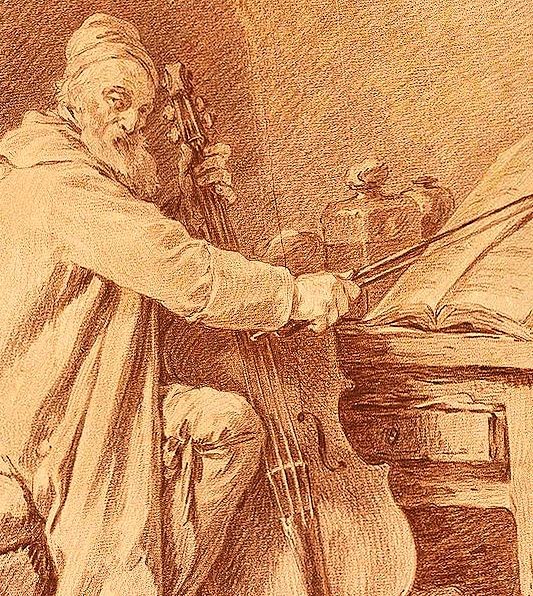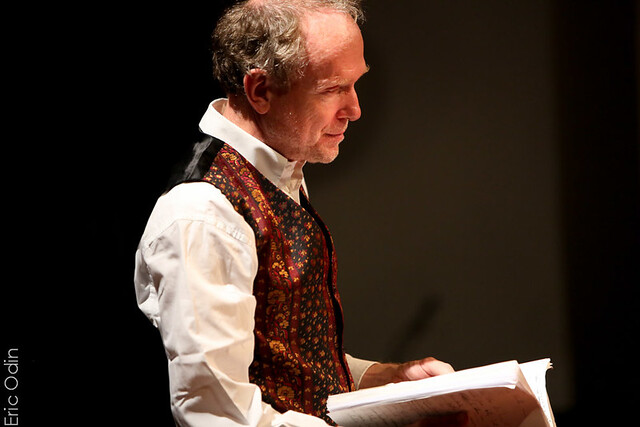Share This
Album at a Glance
Tags
Related Posts
Martin Berteau (1708-1771): Sonatas & Airs for Violoncello / Christophe Coin
Posted by Paul Ballyk on Nov 4, 2014 in Classical | 0 comments
The music of French composer Martin Berteau has never been well represented on record. In fact, all I discovered were brief appearances on a handful of 18th-century cello anthologies. That's surprising given the fact that Berteau is widely considered to be the founder of the French school of cello playing, if not all of modern cello performance. Offering over an hour of Berteau's beautiful music, this Glossa release titled simply Martin Berteau, Sonatas & airs for violoncello is a landmark release - and all the more so as Berteau's proponent here is renowned French cellist and early music specialist Christophe Coin.
French gambist Martin Berteau (1708-1777) is said to have made his personal discovery of the violoncello during a brief visit to Bohemia, and he devoted himself to the somewhat smaller, more agilely managed instrument from that point forward. Up until this time, the accepted role of the viola da gamba and the violincello was as a basso continuo instrument. Broadening the expressive and technical possibilities of the instrument, Berteau raised it from this supporting role to one of a true solo instrument in its own right.
Berteau was a renowned master of his instrument and teacher who influenced every violoncellist who followed him. So how can it be that he became so lost to posterity? One certain contributing factor was simply confusion over his name. By coincidence, the name "Martin" was under claim by a number of 18th-century musicians connected to the cello, including Giovanni Battista Sammartini (frequently referred to as 'Martino' by his contemporaries) who had long been credited with the popular Cello Sonata Op. 1, no. 3 appearing on this album, which was rightfully attributed to Berteau, only in 1989.
Most of the music on the recording is drawn from the six Sonate da camera, Op. 1, five of which are included. The solo cello line is accompanied by a basso continuo of harpsichord and a second cello, performed here by Markus Hunninger and Petr Skalka. The exception is Sonata VI, a trio for three cellos where the performers have elected to dispense with the harpsichord in favor of displaying the rich sonorities of the three cellos alone. The sample in the sidebar from the album is how it opens, Grave and Moderato from the Sonata V in E flat major. There are additional selections for you to hear in the video provided by Glossa below. The music is by turns graceful, spirited, rhythmically incisive and always melodically inventive, altogether perfect for the instrument. A large part of the music's charm is in how Berteau's harmonic progression unfold in such interesting and gratifying ways.
For the cello student or aficionado, this is an obvious acquisition, but its appeal will reach much further than this. For any music lover, it will be a delightful discovery, all considerations of historic interests and musical specialties aside. It's a charming album I've enjoyed over and over again.
Whatever composer, period or style Christophe Coin turns his attention to, it is certain to be full of interest and musicality. Such is the case with a new recording from the Schola Cantorum Basiliensis – where Coin teaches – whose focus is one of the founding fathers of modern cello playing, the Frenchman active in the middle of the 18th century, Martin Berteau. Known both for training many of the important cellists from later in that century and for introducing technical innovations which extended the instrument’s range and expressiveness, Berteau’s composing voice has been very little known (some of his compositions also being confused with those by others).
An ideal candidate, therefore, for a thorough-going reappraisal from a musician as talented as Christophe Coin (who, like the composer, played the viola da gamba before turning to the cello), with the help of two of his own former cello students in Petr Skalka and Felix Knecht. Cello Sonatas and Airs make up this programme – including one sonata in which all three cellists take part. The three of them play on instruments from the epoch, whilst Markus Hünninger provides harpsichord accompaniment.
In the accompanying booklet essay for this new release (issued by Glossa as part of its ongoing relationship with the SCB), Thomas Drescher traces the lifespan of Martin Berteau, an overlooked compositional figure who leads us back to the roots of an important instrument of our musical culture.
Source: Glossa Music
 Martin Berteau |
Martin Berteau, composer
Martin Berteau (c. 1700 - 1770) was a French cellist, cello teacher, and composer. He is widely regarded as the founder of the French school of cello playing. Descriptions of Berteau’s life are often unreliable and exaggerated. As a result, little is certain about his life. He probably studied viola da gamba in Bohemia with Kozecz. J.-F. Fétis, who wrote a Biographie universelle des musiciens (1835-1844), said that Berteau made his debut on the cello in 1739 at the Concert Spirituel, playing his own concerto. However, his name is not mentioned in any media of the time, and nether his concerto nor sketches of it have been found. The only reference of his name was made by Jean-Jacques Rousseau who mentioned having heard Berteau perform in Paris in 1753. With the exception of a few cello sonatas, much of Berteau’s work has been lost. For many decades Berteau’s well known Cello Sonata in G major, Op.25 was credited to the Italian composer Giovanni Battista Sammartini. |
|
Christophe Coin |
Christophe Coin, violoncello Christophe Coin (b.1958) is a French cellist, viola da gamba player and conductor active in the field of historically informed performance. He is the cellist of the Quatuor Mosaïques and is the director of the Ensemble Baroque de Limoges. Born in Caen, Coin studied with Jacques Ripoche. At the Conservatoire de Paris, he studied cello with André Navarra and graduated in 1974. From 1976, he studied on a scholarship in Vienna. He was influenced by Nikolaus Harnoncourt, among others. From 1978, he studied viola da gamba with Jordi Savall at the Schola Cantorum Basiliensis. He worked first mainly as a soloist. In 1984, he founded the Mosaïques Ensemble and in 1987 the string quartet Quatuor Mosaïques with Erich Höbarth, Andrea Bischof and Anita Mitterer, all players members of the Concentus Musicus Wien. The quartet has performed mostly works of the classical period on period instruments, with a focus on less known works. After a 2012 concert in New York, their playing was reviewed as “balancing period instruments and historically informed performance practice with contemporary interpretive impulses like no other”. Since 1991, Coin has been director of the Ensemble Baroque de Limoges, for performances of cantatas, oratorio and operas of the 17th and 18th century on period instruments. Since 1988, Coin has been a teacher for Baroque cello and viola da gamba at the Conservatoire National Supérieur de Musique in Paris and at the Schola Cantorum Basiliensis. He has organised workshops on the building and playing of historic instruments. |
| Petr Skalka |
Petr Skalka, violoncello Petr Skalka, born in Prague in 1974, was first introduced to music by his father. He started studying the cello in the Pilsen Music Conservatory, Western Bohemia. Simultaneously he has performed as a soloist with symphony orchestras. He went on to win national awards. His interest in early music and historical performance practices gradually led him toward the study of early music. He left Western Bohemia to study baroque cello and chamber music at the Schola Cantorum Basiliensis (SCB, Basel, Switzerland), where he studies under the tutorages of the French cellist Christophe Coin. He graduated in 1999 and received a degree in early music. Now he has been teaching at Schola as an assistant-violoncello specialist for several years. An accomplished musician, Petr Skalka is privileged to work regularly with a number of renowned chamber ensembles and renowned musicians across Europe in the most famous concert halls. The recordings with ensembles Cafe Zimmerman or Rincontro have been awarded the unique European prizes (Choc de l’année 2002 du Monde de la Musique, Cinq étoiles de Goldberg). Petr Skalka and his family have been living in West Bohemia. Source: http://www.skalka.net/ |
| Felix Knecht |
Felix Knecht, violoncello Felix Knecht (b. 1972) is a Swiss cellist. A native of Chur, he studied cello in Basel and Biel under Conrad Brodtbek, and baroque cello with Hidemi Suzuki in Brussels and Christoph Coin in Basel. He has received additional instruction from Anner Bylsma and Gerhart Darmstadt, among others. His concert activities have taken him throughout Europe as well as to the USA and South America, notably with the ensembles La Cetra, Basel; Esemble Turicums Capriccio Basel; Venice baroque orchestra, and the Ensemble baroque de Nice. Source (German): http://musik.kloster-michaelstein.de/de/kurse-konferenzen/dozenten/dozent.html?details_id=245 |
 Markus Hünninger |
Markus Hünninger, harpsichord Markus Hünninger is a German harpsichordist. Born in Remscheid, North Rhine-Westphalia in 1962, he pursued studies in historically informed performance at Schola Cantorum Basiliensis in Basel, graduating in 1984. Source (German): http://www.scb-basel.ch/index/112088
|
![]() About Paul Ballyk
About Paul Ballyk
all about Paul
Twitter •
| Thinking about purchasing this album?
Follow this link for more album details or to make the purchase. Buy it now |
“Not just recommended. Guaranteed.”
We stand behind every album featured on Expedition Audio. Our objective is to take the monetary risk out of music exploration. If you order this album from HBDirect.com and do not like it you can return it for a refund.
Martin Berteau: Sonatas & Airs for Violoncello / Christophe Coin, P. Skalka, F. Knecht, M. Hunninger




